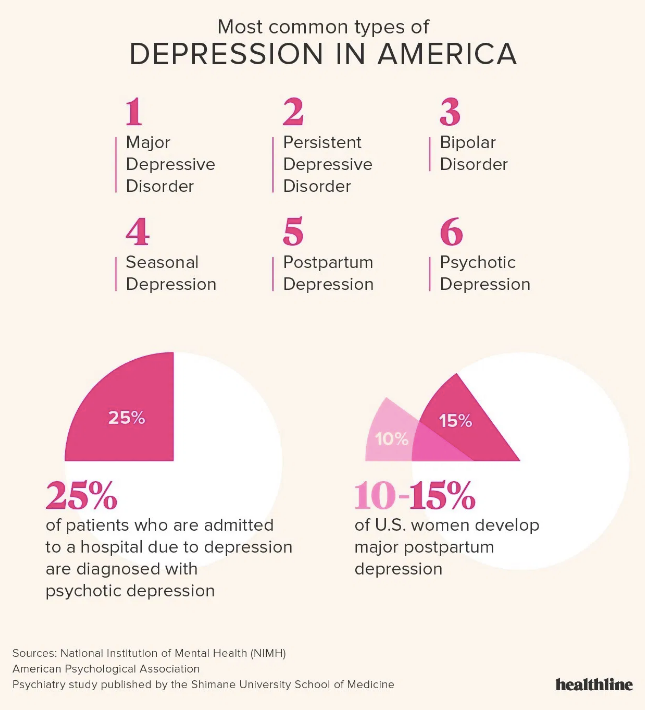
Like happiness, sadness & grief are natural human emotions. But a major depressive/mood disorder isn’t healthy and should not be taken lightly. Depression and anxiety are common diagnosable conditions; however, if left untreated, it can lead to serious health complications. According to the World Health Organization (WHO), depression is the leading cause of disability worldwide, affecting people across all age categories.
For many of us, the uncertainty building around COVID-19 can be the toughest thing to cope with. We still don’t know how severely it will affect our lives in the long term. That makes it all too easy to inflate it in our minds, creating a downward spiral resulting in overwhelming dread and panic. The impact is routed deeply for people with existing mental health disorders, anxiety, or depression.
According to the CDC, stress during an infectious disease outbreak can include:
- Fear and worry about your health and the health of your loved ones
- Changes in sleep or eating patterns
- Difficulty sleeping or concentrating
- Worsening of chronic health problems
- Worsening of mental health conditions
- Increased use of alcohol, tobacco, or other drugs
What is Depression & Its Symptoms?
With 264 million people suffering from depression globally, it has become a common mental disorder. Depression is a mood disorder that involves a persistent feeling of sadness and loss of interest. It is different from the mood fluctuations and short-lived emotional responses to everyday challenges in life.(WHO)

Adverse life events such as unemployment, bereavement, psychological trauma, etc. can also make people depressed. Doctors consider feelings of grief to be part of depression if they persist.
A depressive episode is categorized as mild, moderate, or severe, depending on the number and severity of symptoms.
According to the American Psychological Association, symptoms of depression could include:
- Mood swings/depressed mood – all day long, sometimes days
- Unintentional, significant weight loss
- Feeling exhausted even after adequate sleep
- Feeling worthless or guilt
- Having a hard time concentrating or making decisions
- Suicidal tendencies, thoughts of ending your life
Causes for Depression
There are about 16.2 million adults in the United States, or 6.7 percent of American adults, have had at least one major depressive episode each year (Healthline). There are quite a few probable causes and many factors that combine to trigger symptoms. Factors that are likely to play a role include:
- Genetic features
- Changes in the brain’s neurotransmitter levels
- Environmental factors
- Psychological and social factors
- Additional conditions, such as bipolar disorder
(Medical News Today)
Tips for Dealing with Depression During A Crisis
The panic that pervades our minds during an emergency makes us more vulnerable to feeling isolated. When we are alone, it’s hard to distinguish what is real as we watch the news and listen to radio programs and scroll our social media. That’s just not a good environment for someone suffering from depression.
These tips are to help empower you to help yourself. We first advise you to follow only trustworthy sources such as the CDC, the World Health Organization, and your local public health authorities to know about the actual state of a crisis such as COVID19.
Apart from this, these tips from Mental Health First Aid (MHFA) can help someone with anxiety or depression during a high stress time:
- Assess for risk of suicide or harm. Identify if they are experiencing a crisis such as a panic attack or suicidal thoughts, and address that first. I you are not able to physically visit the person; you can help assess their state of mind over the phone or text message. If the person’s life is in immediate danger, call 911.
- Listen without any judgments. If the person is in a crisis/self-isolation, stay connected virtually and ask how they are feeling, how long they have been feeling that way, etc. Be ready to listen to their concerns and share supportive input. Active listening is the best way to know what the person is feeling.
- Give reassurance and information. Your support can have a significant impact on the person. Reassure them that it is appropriate to experience fear, sadness, or anxiety during situations like this. Remind them that help is available, and you are there for them.
- Encourage appropriate professional help. Offer help to find a professional for support, such as a primary care physician, mental health professional, psychiatrist, or certified peer specialist. Behavioral health care providers can provide services by phone or secure videoconferencing.
- Encourage self-help and other support strategies. Self-help strategies and reaching out for support from family, friends, faith communities, and others who have experienced depression or anxiety (peer supporters) can make a difference.
(MHFA)
Self-Care for Your Mind
During crisis events such as the COVID19 pandemic, we are in a time of massive social and economic upheaval. Undoubtedly, having a mental condition during these unprecedented times can make you feel overburdened. It’s essential to make your health a priority during this time. Critical self-care activities are sleep, physical exercise, and a healthy diet. Simultaneously, practicing the art of gratitude can have a significant impact on your emotional health – every morning, think of all the things you are thankful for and teach your family members too to do the same.
24/7 Local Resource Hotlines:
National Suicide Prevention Lifeline
1-800-273-8255
Crisis Intervention of Houston
THE HOTLINE: 832.416.1177 | TEEN: 832.416.1199 (CALL) | TEEN: 281.201.4430 (TEXT)
Harris Center Crisis Line
(866) 970-4770
24/7 Emergency Room Physicians
Our emergency rooms are equipped to intervene and support you or your loved ones in a mental health crisis. Our Board-Certified Emergency Physicians are trained to create a plan of intervention and action for patients who are experiencing a need for immediate medical help. We work in an environment of complete confidentiality and have resources that can lead you to the next steps of creating a long-term treatment plan.
Works Cited
Kapal, Rubina. “How to Help Someone with Anxiety or Depression During COVID-19.” Mental Health First Aid, 20 Mar. 2020, www.mentalhealthfirstaid.org/2020/03/how-to-help-someone-with-anxiety-or-depression-during-covid-19/
“Depression: Understand Symptoms and Get Help.” Crisis Text Line, www.crisistextline.org/topics/depression/#symptoms-2.
“Coronavirus Anxiety: Coping with Stress, Fear, and Worry.” HelpGuide.org, 9 Apr. 2020, www.helpguide.org/articles/anxiety/coronavirus-anxiety.htm.
“Depression.” World Health Organization, World Health Organization, www.who.int/en/news-room/fact-sheets/detail/depression.
Goldman, Laura. “Depression: What It Is, Symptoms, Causes, Treatment, Types, and More.” Medical News Today, MediLexicon International, 22 Nov. 2019, www.medicalnewstoday.com/articles/8933#causes.
Koskie, Brandi. “Depression: Facts, Statistics, and You.” Healthline, Healthline Media, 14 May 2019, www.healthline.com/health/depression/facts-statistics-infographic#1.
“Coronavirus Anxiety: Coping with Stress, Fear, and Worry.” HelpGuide.org, 9 Apr. 2020, www.helpguide.org/articles/anxiety/coronavirus-anxiety.htm
















